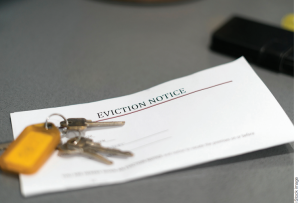 SJC Rules Against Tenant in Eviction Case
SJC Rules Against Tenant in Eviction Case
By Christopher R. Vaccaro
Special to Banker & Tradesman
In a case involving the Massachusetts appeal bond statute in a summary process eviction case, the Supreme Judicial Court recently ruled against a family that had been occupying a foreclosed property for 11 years without making mortgage or rent payments.
Dorothy Menzone refinanced her Webster home in 2012. Her mortgage loan required monthly payments of about $1,400. Dorothy made regular mortgage payments to her bank until she died the following year. After Dorothy’s death, her daughter Elizabeth continued to live in the house without making mortgage payments. Elizabeth’s adult son Shawn and her daughter Jennifer lived there as well.

The bank did not foreclose its mortgage until 2019, after which it transferred the property to Edward Cianci, who in turn transferred it to Raymond Frechette and himself. Elizabeth and her children continued to live in the house without paying rent.
In 2022, Frechette and Cianci began eviction proceedings against Elizabeth and her children in Housing Court. The court ordered them to pay $1,500 per month in interim use and occupancy payments, which they failed to pay. The court eventually rendered a judgment of possession to Frechette and Cianci in 2023, but Elizabeth appealed. Her failure to make interim use and occupancy payments continued. This delinquency totaled $16,500 at the time of her appeal.
Frechette and Cianci moved for the Housing Court to require Elizabeth to pay for an appeal bond. Elizabeth filed an affidavit of indigency and asked the court to waive the appeal bond requirement, which the court agreed to do. However, the judge ordered her to make use and occupancy payments of $1,275 per month as a condition of her appeal, as required under the appeal bond statute.
Monthly Payment During Appeal Deemed Fair
Elizabeth initially argued that Frechette and Cianci, who had purchased the property from the bank after the foreclosure sale, lacked standing to evict her. The SJC disagreed, ruling that they, as owners of the property, clearly had standing to evict Elizabeth and her children. Elizabeth next argued that the statute allowing courts to waive the appeal bond for indigent tenants in eviction cases, also released her from any obligation to make use and occupancy payments during her appeal. The SJC found this argument to be contrary to the appeal bond statute, and ruled that tenants in eviction actions must make use and occupancy payments, even if the court waives the appeal bond.
Elizabeth next tried to convince the SJC that requiring her to make use and occupancy payments violated her rights to due process and equal protection under the U.S. Constitution and the Massachusetts Declaration of Rights, because she and her children lacked the ability to pay $1,275 per month to occupy the house.
The SJC was unmoved. It noted that Elizabeth had not made mortgage or rent payments for 11 years, and that she and her children were not making use and occupancy payments required by court order in 2022. The SJC noted that a $1,275 monthly use and occupancy payment was rational and represented “a fair balancing of interests between the parties.” Given the circumstances of this case, the SJC ruled that requiring Elizabeth to make modest use and occupancy payments to maintain her appeal did not violate her constitutional rights.
The SJC concluded that a trial court judge may not waive the statutory requirement that tenants make use and occupancy payments pending their appeals in eviction cases. It also ruled that when competing interests and constitutional rights of landlords and tenants are at stake, a motion judge may order use and occupancy payments that exceed the amount a tenant can pay, as long as the judge properly weighs relevant factors when balancing the interests of the parties.
The SJC’s well-reasoned decision required 32 pages of typed double-spaced text. But looking beyond the decision’s lengthy legal analysis, the most important aspect of this case is that Elizabeth resided in a house, without making any mortgage or rent payments whatsoever, for 11 years. It is difficult to pity her and her children.
Download the article as seen in Banker & Tradesman on July 29, 2024. Learn more about Christopher R. Vaccaro.